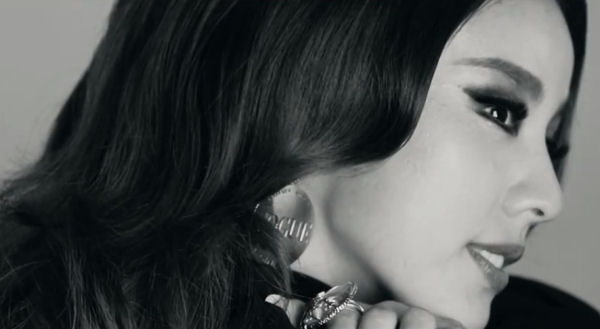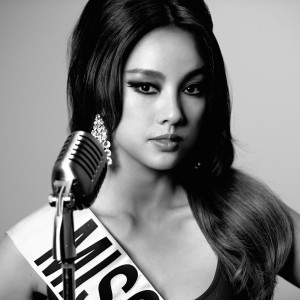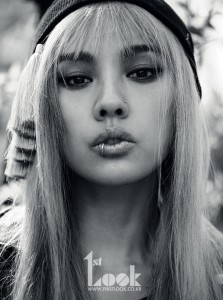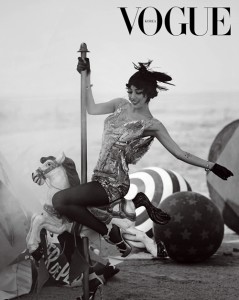music

Piecing Together Lee Hyori’s “Monochrome”
 I’m just going to put it out there—while going through Monochrome for the first time, I just wanted to throw it at the wall for not having the kind of ostentatiousness that every dance pop-drenched album of Lee Hyori‘s seemed to have in the past. I felt some disappointment at the lack of another “Chitty Chitty Bang Bang,” and the power house pop music that filled the likes of H-Logic and It’s Hyorish. I have grown to expect a Hyori release to live and breathe those elements, so I was not happy to see all of that gone, even though she technically warned all of us it that it was happening. In spite of that, right before I virtually “smashed” the album to smithereens in my heart, I stopped to wonder if I actually hated the album as much I thought I did. The startling thing is that I didn’t. Most of the songs are quite good once you let go of any preconceived notions you have about listening to a Lee Hyori release. In fact, to really understand this album, you have to let go of every generalization of K-pop you’ve ever had.
I’m just going to put it out there—while going through Monochrome for the first time, I just wanted to throw it at the wall for not having the kind of ostentatiousness that every dance pop-drenched album of Lee Hyori‘s seemed to have in the past. I felt some disappointment at the lack of another “Chitty Chitty Bang Bang,” and the power house pop music that filled the likes of H-Logic and It’s Hyorish. I have grown to expect a Hyori release to live and breathe those elements, so I was not happy to see all of that gone, even though she technically warned all of us it that it was happening. In spite of that, right before I virtually “smashed” the album to smithereens in my heart, I stopped to wonder if I actually hated the album as much I thought I did. The startling thing is that I didn’t. Most of the songs are quite good once you let go of any preconceived notions you have about listening to a Lee Hyori release. In fact, to really understand this album, you have to let go of every generalization of K-pop you’ve ever had.
Hyori fumbles around with a sundry of sounds in Monochrome, from the country inspired “Holly Jolly Bus,” and “Bounced Cheeks of Love” to eighties-inspired throwback “Love Radar Love Radar.” Most of these are laid-back, restrained (which seems to be a running theme in K-pop releases recently) and have minimal embellishments. Hyori’s deeper voice is really beneficial here because it fills out the sound even with the lack of bells and whistles, and stylistically corresponds with the kind of music she’s aspiring to embody. Most of the time, this works really well, like in the case of the simplistic yet lovely “Love Radar Love Radar.” At other times though, the simplicity of the music can become harmful, often making a song appear juvenile or reflect the limitations of Lee Hyori’s voice.
In the more leisurely songs, the minimalism conveys beauty and sophistication, where timbre of Hyori’s voice could not be more perfect. However, since we live in a K-pop world where danceability, modern hooks, and boldness is key, uptempos like “Full Moon” and “Bad Girls” tend to not live up to our expectations. “Bad Girls” and “Full Moon” are far from being “bad” songs (though they lack dynamics or any real color), but I don’t think that it’s going to sell in this day and age. Thirty years ago, it would probably be a different story; nowadays, “Bad Girls” is only going succeed within a niche group and die-hard fans of Hyori.
The reason for this is not so much that the song is retro-inspired, because we’ve seen that plenty of times through songs from groups like the Wonder Girls to great success. The issue is that Hyori doesn’t have the powerhouse vocals to sell her full on throwback songs on her own. Certainly “Bad Girls” feels flat for the obvious reason that the song boxes itself in by drawing the listener to repetitious elements rather than the more developed and colorful sections. But more importantly, the weakness of “Bad Girls” lies in the fact that Hyori tries to sell it as a very danceable and powerful song when she cannot back it up with her voice. “Full Moon” falls to a similar fate, especially when you want her to belt out the chorus like there’s no tomorrow and then you realize that she’s never going to. Hyori got away with songs like “Chitty Chitty Bang Bang” and “U-Go-Girl” in the past because those songs relied more on the instrumentals for the power, rather than the vocals.
But it’s for this very reason that the soulful and restrained music on this album does succeed. “Trust Me” is a fantastic song that really does justice to ABBA-esque style, “Special” would be perfect for a diner that you’d find on Route 66 (for the Americans around here), and “Crazy” is so much fun that it’s nearly impossible to hate the song. Even though they’re all brighter songs on the album, they don’t need the singer to belt out anything.”Trust Me,” “Crazy,” “Special,” and even “Holly Jolly Bus” have an air of effortlessness that has to be conveyed by more “casual” singing. The singer needs to be as relaxed as the song, and Hyori does that better than almost anyone in K-pop even if she’s not best singer around. I would never give songs like these to singers like Jonghyun, who I guarantee will butcher the whole thing by over-singing.
Unlike “Bad Girls,” I’m in love with “Miss Korea” as a title song. The delivery is just spot on and definitely fits among the songs I just mentioned above. I would even say that “Miss Korea” beats all of the aforementioned songs in effortlessness and just overall synergy. The only thing that could make this song better would be hearing Hyori’s deep and rich vocals with a live band. The same goes for “I Hate Myself,” though I don’t find this song to be as well done or as impactful as “Miss Korea.”
 “Amor Mio” is a song I basically contradicts everything I said about slower songs on this album, because this was complete and horrible let down. I would even call it the worst out of the whole album. First of all, you should never choose a duet partner that can easily out sing you on your own album. I honestly thought that “Amor Mio” was better suited to be Park Ji Young‘s (of Honey-G) song that featured Lee Hyori, rather than the other way around. Even then, the lethargic song could not be saved by Park Ji Young rich vocals alone, since Lee Hyori’s adds negative points to the song. Even in the live performance, I saw nothing come out of Hyori. Sure she sounds “pretty” but there’s no life to the vocals, which becomes especially apparent when you hear them paired against her partner’s. “Amor Mio” hinges on the vocal dexterity of the singer, and as long as Hyori sings the way she does here, “Amor Mio” will continue to sound hopelessly mediocre.
“Amor Mio” is a song I basically contradicts everything I said about slower songs on this album, because this was complete and horrible let down. I would even call it the worst out of the whole album. First of all, you should never choose a duet partner that can easily out sing you on your own album. I honestly thought that “Amor Mio” was better suited to be Park Ji Young‘s (of Honey-G) song that featured Lee Hyori, rather than the other way around. Even then, the lethargic song could not be saved by Park Ji Young rich vocals alone, since Lee Hyori’s adds negative points to the song. Even in the live performance, I saw nothing come out of Hyori. Sure she sounds “pretty” but there’s no life to the vocals, which becomes especially apparent when you hear them paired against her partner’s. “Amor Mio” hinges on the vocal dexterity of the singer, and as long as Hyori sings the way she does here, “Amor Mio” will continue to sound hopelessly mediocre.
It’s ironic that “Somebody” would come after “Amor Mio” in the album, because these are the kind of vocals I wanted to be featured in “Amor Mio.” This song exemplifies Hyori at her finest in this album. “Someday” is a very simplistic song that is entirely carried by the chorus (it doesn’t even have a proper bridge)—a compositional structure that could easily turn out to be a disaster. However, this song goes from bland to one of the best songs on the album on delivery alone. Though Hyori’s voice still has limitations, she made the best of what she has: each and every slide was well executed, the enunciation of the lyrics were spot on, and the soul she put behind her voice was incredible. I could not believe that Hyori could sing the way she did in “Somebody.” —I was floored. That’s it. I was absolutely and utterly floored.
Monochrome only gets better with “Show, Show, Show” a song that was featured in Hyori’s Vogue Photoshoot earlier this month. It may be a Monrose remake, but it’s undeniable that Lee Hyori did justice to the song. Her vocals are as great as they were in “Somebody”; colorful, effortless, rich, and wonderfully controlled.
“Better Together” is another winner in my book, slightly tacky intro and lyrics aside. Again, there’s nothing complex about the song compositionally, though the melody is beautiful from start to finish. From the orchestra to the drums to the vocals, everything about this song fully immerses the listener. This occurs due to the great connectivity between all the elements and layers within the song. Nothing stands out more than anything else, so throughout the song your ear picks out the different layers at different moments, giving the song dimension. I concede that the song may edge on the repetitious, but there’s enough within the song to engage the listener while he/she gets sucked into the gorgeous melody.
I have never heard Lee Hyori sound more beautiful than she did in “Oars.” That song literally gave goosebumps just by how well Hyori conveyed the haunting aspects of the song. I even saw glimmers of power and emotion behind her voice; a sense of desperation and longing even though I understood not one word in the song. Ending the album with “Oars” was devastating to me, because I just didn’t want the album to end at that point. Although the song itself is certainly wonderful, the sensation of finality from the song was especially saddening for me (albeit this should make “Oars” even more appropriately placed). I highly recommend you read the lyrics of “Oars” as you are listening because they’re actually quite interesting.
Monochrome is certainly not going to rock the K-pop world the same way that H-Logic and It’s Hyorish did (I have a feeling it’s going into the infinite trash bin of mediocre K-pop whether it deserves it or not), but it doesn’t let go of the confidence that Lee Hyori has had from the beginning. From an objective standpoint, Monochrome, though not perfect, technically does everything it’s supposed to: it clearly has confidence, the production is clean, and it does mesh all together in a broad retro theme. Its only real fault, perhaps, lies in that it gets lost in its own grand theme and forgets that musically unifying the album is as important to its cohesion as the theme itself. Songs like “Wouldn’t Ask You,” or “Holly Jolly Bus” may “verbally” fit the overall theme, but musically they seem extremely out of place, as nice as they do sound. At times, the song placement within the album also causes other songs that are placed adjacent sound jarring and/or in-cohesive. However, what’s really unfortunate about this album is that the best of Monochrome comes at the end, leading to very little satisfaction coming out of finishing the album. Your mouth will be left dry at the end with just a fleeting taste of the possibilities for Monochrome. If Lee Hyori built a whole album around the sound of the last four songs I mentioned, I will buy that album in a heartbeat—I’m not kidding.
 Regardless, the bottom line is that Monochrome is an acquired taste. There aren’t going to be a lot of people who like it because most of the songs sort of fade into the background (as though the album was entirely comprised of B-sides), a stark contrast to bold and vibrant releases that had defined Hyori in the past. However, getting caught up in expectations will certainly be a mistake when listening to this album. The beauty of Monochrome finally clicked with me when the album automatically looped back to the beginning, and I felt the full circle effect of the album. Although each piece of the album may feel haphazard when you focus on continuity of individual elements, the key point to this album is actually ambiance, not necessarily cohesion. Monochrome legitimately took me back several decades without seeming like it was just a gimmick, and opened my eyes to how soothing music used to be. As K-pop listeners, most of us are used to blasting synths, layers upon layers of vocal processing, instrumentation, and harmonization. We’ve come to expect an earworm from each and every release ever, and are upset when we don’t like a song instantaneously. It’s the “Gee”s, “I Am The Best”s and “Fantastic Baby”s that we gravitate towards and remember, while leaving behind pretty much everything else amongst the cacophony that makes K-pop what it is. After spending so much time caught up in the dynamic and forward moving 21st century K-pop, to be taken back to simpler times, even for just a little while, is incredibly freeing.
Regardless, the bottom line is that Monochrome is an acquired taste. There aren’t going to be a lot of people who like it because most of the songs sort of fade into the background (as though the album was entirely comprised of B-sides), a stark contrast to bold and vibrant releases that had defined Hyori in the past. However, getting caught up in expectations will certainly be a mistake when listening to this album. The beauty of Monochrome finally clicked with me when the album automatically looped back to the beginning, and I felt the full circle effect of the album. Although each piece of the album may feel haphazard when you focus on continuity of individual elements, the key point to this album is actually ambiance, not necessarily cohesion. Monochrome legitimately took me back several decades without seeming like it was just a gimmick, and opened my eyes to how soothing music used to be. As K-pop listeners, most of us are used to blasting synths, layers upon layers of vocal processing, instrumentation, and harmonization. We’ve come to expect an earworm from each and every release ever, and are upset when we don’t like a song instantaneously. It’s the “Gee”s, “I Am The Best”s and “Fantastic Baby”s that we gravitate towards and remember, while leaving behind pretty much everything else amongst the cacophony that makes K-pop what it is. After spending so much time caught up in the dynamic and forward moving 21st century K-pop, to be taken back to simpler times, even for just a little while, is incredibly freeing.
So thank you Lee Hyori, for allowing all of us to have this unique musical experience.
Score: 4.5/5, for this is a throwback album done with confidence and respect for the eras in music it draws influence from.
(B2M Entertainment, 1st Look, Vogue, Youtube [1] [2])
No comments:
Post a Comment